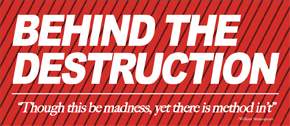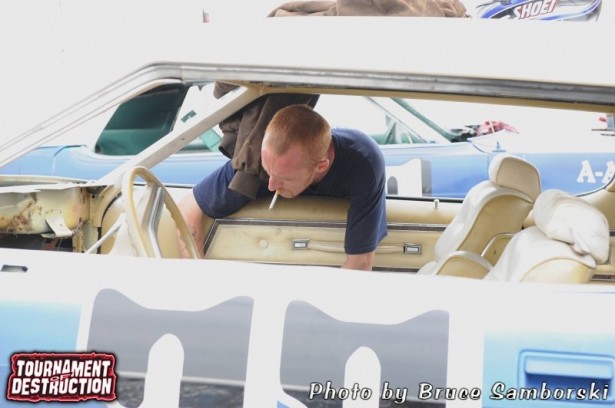I was talking to Matt Pierce for last week’s story about the new look Bad Company team. During our conversation, I made some off-handed remark about how Bad Company had a lot of talent on its roster, but no on-field chemistry yet. While Kyle Shearer and Brice Martin drove together last year, and Jason Ritacco and Pierce did as well for Seek-N-Destroy, the four of them had zero experience together on the track.
When I commented on this, Pierce sort of snorted and waved me off. “I don’t think it’s a big deal,” he told me. He saw great things coming for Bad Company and didn’t think that the team’s complete lack of time driving together would in any way impact them.
I found this belief somewhat shocking. When Pierce told me that he didn’t think it was a big deal, I thought to myself, “That just can’t be right.” Logic would dictate that teams with more on-field experience would be better.
The best offensive lines in football are generally the ones that have played together the longest. There’s an understanding about how each man will behave and what his tendencies are. Knowing those idiosyncrasies thusly allows the man’s teammates to play off of him with more confidence. The two teams that were the consensus preseason favorites to battle for the 2011 championship were also the two teams with the drivers who had been racing together the longest, Reckoning and Orange Crush.
So, of course, on-field experience and chemistry helps a team…
…Right?
“I’m not worried about our lack of experience together,” Pierce stated. “I mean, last season, Levi [Turnbaugh], Jason [Ritacco] and Greg [Messich] had never driven together and we won the night in our first night.”
I stopped to think about that for a minute; Pierce seemed to have a point.
What’s more, in 2009, when Seek-N-Destroy was a brand new team, they had also won the night in their first night of racing. Cementing this thought in my mind, I realized that another new team, Reckoning, won the second night of the 2009 season. 2011’s new team, Full Throttle, made it to the finals in their first night of racing. Orange Crush brought in several new drivers in 2010 and they also made it to the finals in their first night of racing together.
And so I started wondering, just how important is a good on-track chemistry?
My first step to understanding this concept was to call Orange Crush’s Johnny Ryan.
Ryan has been racing in the demos for years and years and is a fairly divisive driver; he’s the Joakim Noah of the TDA. Drive with him and you love him; drive against him and you hate him. Underline hate. Then bold it. He has a penchant for racing hard, building strong cars and winning championships. He also has a reputation for hitting some driver’s doors that he shouldn’t have. The dislike aimed at him has caused me to jokingly nickname him Darth Ryan.
Ryan also refuses to race without having Ryan Bleuer and Tom “Brickman” Lewis on his team. Together they form the, uh, Three Crushketeers?
I called up Ryan and posed the question to him. “Aw, man,” he chuckles. “Chemistry is really important.” Ryan stops himself there and explains that there are two types of chemistry: on-field and off-field chemistry. “Art Scarbro put it best, 25 years ago, when he said, ‘A happy team is a winning team,’” Ryan smiles. “You see it time and time again, teams that can’t get along in the shop, teams that don’t build together, they don’t do well.”
Ryan is quick to explain that this off-track camaraderie certainly impacts the on-field chemistry. “It begins in the shop,” he starts. “What you do off-field as a team genuinely impacts the way you drive on it.”
Interested in hearing the opinions of several different drivers on this matter, I not only spoke to Ryan, but also to Full Throttle’s Ron Johnston and Reckoning’s Steve Gursky Jr. Johnston spent years racing with Rob Stahulak and seemed like he’d have a different insight into the matter courtesy of his brand new team’s First Night upset of Orange Crush. Gursky Jr. has been racing with his Reckoning teammates for three years and his brother, Chris McGuire, for longer than that. All three men put a premium on on-track chemistry. As I continued chatting with each man, I began to realize that there was a much better word to describe the concept we were discussing than chemistry. That word is ‘trust’.
“I’ve raced so many times with Ryan [Bleuer] that I seldom have to second guess what he’s doing or what he’s going to do on the track. I know he’s going to take care of his job and I don’t have to worry about him. It’s the same thing with Brickman,” Ryan tells me.
“It’s all about paying attention and listening to each other,” Johnston says. “As long as everyone listens and knows what the other guys are going to do—and they do it—it’s not a problem.”
In this respect, the concept is very similar to the relationship between a quarterback and a wide receiver. When the play is called, the quarterback needs to know that the receiver is going to be where he is supposed to be so that he doesn’t end up throwing it into coverage for no reason. If the receiver does break off his routes to improvise something, really all he’s doing is annoying his quarterback. Whether you’re playing football or racing cars, you always want to be on the same page as your teammates.
“I watched Ryan Bleuer race all of 2007,” Ryan states. “I was excited to come to the Junkyard Dogs because Bleuer and Kahuna were pretty talented lap runners. I knew Bleuer in particular had an extra gear in him. Even with that, it was pretty nerve wracking that first night. We hadn’t figured out what worked! It really showed that first night; Brickman and I weren’t totally trusting of Bleuer and Kahuna and we did some stuff on the track that we probably shouldn’t have because we didn’t know how Bleuer and Kahuna would handle it. Now that I know that I don’t have to go beyond myself.”
Gursky Jr. gets more specific while talking about it. “In our first round race against Bad Company,” he begins, “I was so happy racing with Speedy [Steve Vollbrecht]. After our two runners got taken out, I just knew he’d know what to do in that situation… and he did. He started running laps and my brother [Chris McGuire] began blocking for him. If I was racing with someone else, I’d have been really worried about that.”
Johnston laughs heartily while talking about his trust in his other drivers. “I told my guys what to do and they did it,” he grins. “The only problem we had all night was me in the third round. I told all my drivers to stay away from the wall so that if you got hit in the side, you’d have some give; you wouldn’t be pushed into the wall. I repeated that all night long and then third round I screwed up and got in a position where I was up against the wall. I told all my guys and they listened.” He pauses for emphasis and then exclaims, “I didn’t.”
As Ryan mentioned, that trust often begins in the shop. There, a driver’s teammates can see how hard (or little) he works on his cars. Ryan says this is definitely the case with Bleuer. “I know he’s prepared his cars,” Ryan states emphatically. “I’ve seen him doing it. I know when I get on the track that I don’t have to worry about him breaking down or anything like that. Same with Brickman. I just know those guys are going to do what they need to and that’s a huge load off my mind.”
Ryan laughs and says, “Back in the day, The Locomotives had to build all their cars together before the sun went down because they didn’t have lights! That brought them together very quickly. It really helps.”
There is also an on-field short hand that is present with drivers who have driven together a lot. “I recognize a lot of stuff that Ryan does on the field,” Johnny Ryan says of his teammate. “I know he’s hurting if he makes eye contact with me. Whether it’s from across the track or whatever. He makes eye contact and I know we might have to switch things up.”
“I’ve been around Speedy, Brian [Anderson] and Chris so much, I can read them pretty well,” Gursky Jr. explains. “I can tell a lot about what’s going on with them just by their eyes.” He smiles and says, “That’s why it really screws me up when Speedy’s out there in sunglasses. If he’s not wearing them, I can read his eyes; I’ve raced with him long enough to know what he’s thinking when I see him.”
This last statement brought me back to what originally started this line of thinking: how important is it to have raced with guys previously?
Judging from the information I gleaned, it’s important, but not anywhere near as important as knowing, liking and trusting your teammates. Who could have possibly seen that coming?

